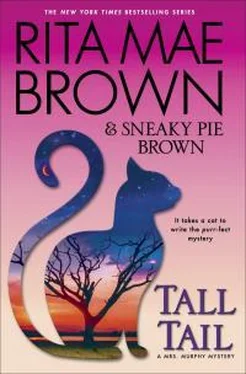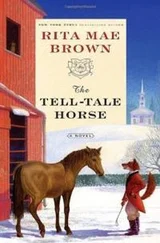“He had a truck title going back to 1952!” Harry exclaimed.
“Was it a Ford?”
“Was.”
“That was the truck my mother wrecked when she got her driver’s license.” Susan smiled. “He said it was the best truck he ever owned.”
Moving to the other side of the desk, Susan opened the top drawer. “Envelopes, stationery, and what’s this?”
Harry took the copper bracelet. “Remember about ten years ago when people wore copper bracelets? Supposed to help the metal balance in your body.”
“That’s ridiculous. And I never saw G-Pop wear this.”
“Doesn’t mean he didn’t put it on when no one was around. Keep going.”
“Pushy,” Susan grumbled. “I hate it when you’re pushy.”
“I do, too,” Pewter commiserated.
Pulling open the bottom drawer, Susan carefully pulled out a huge, ancient family Bible. “Wonder why he took this off the shelf and put it in here?”
“Maybe to protect it from dust. It’s a little raggedy and very valuable.”
Susan opened it to the first page, neatly folded white papers were lodged there. “Hmm.” She began reading the papers. “Diagrams. Look.”
Harry replaced the contents of the long, narrow drawer and shut it while Susan placed the Bible in front of Harry with the diagrams.
“G-Pop’s mother, pneumonia. G-Pop’s father, fatigue, weakness, sudden collapse.” Susan read off the first diagram on large paper.
“He’s made a diagram of cause of death.” Harry pointed to the prior generation, G-Pop’s grandparents. “His grandfather was born in 1862 and died in 1930. Cause of death unknown. Suspected heart attack. Grandmother, breast cancer.” She looked above to reread the cause of his mother’s death. “Pneumonia.”
“People have always known what a heart attack is.” Susan was also fascinated by this diagram.
“A wide umbrella, you can shove a lot of stuff under it. In the end, everyone’s heart gives out. And people knew what cancer was, but I don’t know as they realized how many cancers existed. Breast cancer becomes obvious, as do any cancers producing large tumors. Wonder why he did this and how he researched the results.”
“Easy.” Susan flipped a few front pages in the large Bible, one on the right labeled “Deaths.” While not as artistic as an illuminated manuscript, the old Bible’s pages were impressive, as was the handwriting of successive generations marking Holloway comings and goings. Having a beautiful handwriting carried weight then. It bespoke years of practice starting when one was about six, and it bespoke education and respect. You had to be able to read and write to execute letters in such a high fashion.
“You’re right.” Harry noted the brief description of each passing just as she noted the birth weight of each baby, as well as how many did not live to maturity. “We take survival for granted. Look at the notes by these babies. ‘Weakened. Died in her sleep.’ Or this one, ‘Wasting disease, such pain. Age thirteen.’ Sad. How did parents go on? Seems like everyone, including your grandfather’s grandparents, lost one or two children.” Harry read again. “ ‘Cecil Holloway, born 1860, died 1863. Could take no nourishment.’ Your poor great-grandmother. Imagine watching a child starve and no one knows why.”
Susan soberly looked at the elegant writing in black ink, surprisingly unfaded. “ ‘Hortensia Kelly Holloway, born 1842, died 1888. Cause unknown. Died in her sleep.’ She lost two children, she lost her husband in the war, but somehow she kept Big Rawly together and she never remarried. Amazing what people live through and still accomplish. Do you think we’re as tough as they were?”
“No.” Harry continued reading, then pulled over the diagram.
“Some of these names have a red cross by them. His grandfather. The thirteen-year-old who wasted away. Goes all the way back to Marcia West Holloway, and there’s a full red line under her name. She died at sixty-six. What’s it say in the Bible?”
“Fainted. Never awakened,” Susan read.
“What’s on the other sheets of paper?”
Susan unfolded two more sheets, her grandfather’s upright handwriting very legible. “He wrote out the symptoms of leukemia, when he began to feel tired, headachy. This went on for longer than I knew. Years. He drew squares for when he’d feel poorly then a line up to a plateau.”
“You think he knew?”
Susan pointed to the second diagram. “Sure looks like it.”
“Look at this third diagram.” Susan pulled out another page. It was like the first diagram with the names, births, and deaths of Holloways but this carried forward.
“Your name is on here!” Harry exclaimed.
“It’s like play it forward. He has his name, no death date yet, but that red cross by his name. Penny’s name then Mom and Pauline, a red cross and question mark, and then a red cross by Edward and Edward’s daughter. None for me, and he even cited our children. Look, there’s Danny.”
“ ‘Tested.’ ” Harry puzzled over this notation. “Each of the cousins’ children, his great-grandchildren, have ‘tested’ written by their name and”—she squinted, for the writing was small—“ ‘negative’ by some. Red cross by others.”
“What is this?” Susan threw up her hands.
“I have no idea, but your children and their cousins were all born within the last thirty years.”
“Right,” Susan affirmed. “But so what?”
“These are the only names with ‘tested’ by them. My guess is that everyone born before those thirty years could not be tested. Maybe that’s why he has a question mark by some with a red cross.”
“Died from what?” Susan wondered.
“Well, HIV, for one,” Harry replied.
Susan pulled up a chair, sat next to Harry, studied the diagrams, looked back over the careful citings in the beautiful family Bible. “None of us have HIV, and if we did, apart from sorrow, how could it affect G-Pop?”
“Maybe he had it?” Harry questioned. “Got it before tests.”
“Harry, G-Pop died of leukemia, a blood disorder, and if you go down the list of family deaths, it’s possible other ancestors died of it. Weakness, anemia, that sort of thing, could all be attributed to leukemia. They just didn’t have a name for it.”
Harry leaned back in the big chair.
“Cancer passes, doesn’t it?” Tucker questioned.
“Some do.” Owen seriously considered this. “ Golden retrievers get a lot of cancer.”
“Susan”—Harry sat upright—“when Danny played football for Western Albemarle High, didn’t he have to have tests? Stuff so the coaches would be alert should he become dehydrated, collapse?”
“Yes. We also had to take him for allergy tests,” Susan added. “My daughter, too.”
“Do you remember the tests?”
“I do. For some parents they caused a problem, especially the HIV test. That sent a few right through the roof. There was a test for a heart murmur, what we always called an athletic heart, a heart that skips a beat. They had to blow in a paper bag. Some kind of lung-capacity thing. The list goes on. I suppose it’s for the good.”
“More. Tell me more tests.”
Susan, picking up on the urgency in Harry’s voice, focused intently. “If anyone had a fracture from the past, even early childhood, we had to deliver a current X-ray. I tell you, getting the kids on the teams wasn’t cheap.”
“More. Or let me put it this way, apart from the HIV test, do you remember anything that surprised you?”
A long, long pause followed this. “Come to think of it, there was one. The kids were screened for sickle-cell anemia and the sickle-cell trait at birth. It was quite hush-hush. Only the parents were informed of the results, but the sickle-cell trait could develop into sickle-cell anemia, which can cause sudden death, say, if a football player is training too vigorously in high heat. That was a test done at birth. So Ned and I copied them and gave them to the coach, who promised secrecy. We didn’t care.”
Читать дальше












